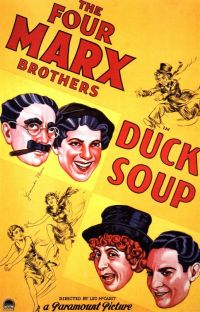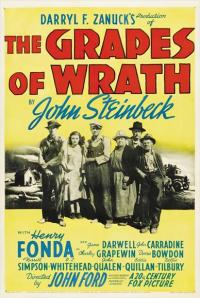At this point it is getting difficult to explain in short what makes these movies so good. They need to be seen and experienced. These movies have the power to move us in ways that mere words are unable to describe. There’s something so “true” in each of the remaining films that allow us to experience the profound, transcendent “Other”. Watch, and allow yourself to engage with them, and engage with the bigger something tied up and hovering around these films.
—This is one of the most beautifully poignant social criticisms ever brought to the screen. It is a very rare film in that it does not try to add or change anything to an already magnificent story. Henry Fonda’s performance is as good as any performance by anyone prior to the arrival of Method Acting in the early 50s, and has continued to be one of the greatest well after that. Cinematographer Gregg Toland is perhaps the greatest cinematographer from the classical Hollywood period, and the beauty of his images in congruence with director John Ford’s masterfully elegant vision is nothing short of stunning. It is easily considered one of the greatest American movies. Winner of 2 Academy Awards, including Best Director.
Directed by John Ford, 1940. Starring Henry Fonda.

—The Seventh Seal is art-cinema perfection from first frame to last. Bergman’s result is one of the most richly complex films ever made. The film is titled The Seventh Seal, a clear reference to the breaking of the seventh seal by the Lamb in Revelation 8:1-5, but these verses, much like the film, are difficult to grasp. The film is about a returning crusader faced with a seemingly godless world, who plays an ongoing game of chess with Death. As difficult as the questions are, again, note the title, and take another look at Revelation. It seems to me a film not so much about the seventh seal, but the present silence between God and man that produces a deep longing for it.
Directed by Ingmar Bergman, 1957. Starring Max Von Sydow.

—Extremely funny, and extremely smart. I’d say this is the second funniest movie ever made. This is one of the most remarkable screenplays ever written, and its remarkable on a number of different levels. It’s highly intellectual, dealing not just with the philosophy of existentialism, but the life of existentialism. It’s also remarkably imaginative, featuring sequences of animation, personal asides, flashbacks, split-screen and characters finding themselves in each other’s memories. But it’s also a very personal film; a film with a simple plot and simple message. Allen understands the intellectual side of life, and recognizes its simultaneous pointlessness and joy. “Our brother thinks he’s a chicken, but we keep him around because we need the eggs.” Oh yeah, and this beat Star Wars for Best Picture of the year at the 1977 Oscars… and I kind of agree with the decision. Winner of 4 Academy Awards, including Best Picture.
Directed by Woody Allen, 1977. Starring Woody Allen and Diane Keaton.

—Many consider Fellini’s episodic masterpiece to be his greatest achievement, and one of the greatest achievements in film history. I agree. The film is the definition of the director and the modernist era of European cinema. Fellini’s semi-autobiographical look at a filmmaker struggling with his next project is perhaps the greatest movie ever made about filmmaking, and is a wonderful meditation on the things and people that drive us. It is not a stretch to say this is as much a spiritual experience as you’ll have watching a movie. Winner of 2 Academy Awards including Best Foreign Language Film.
Directed by Federico Fellini, 1963. Starring Marcello Mastrioanni.

—This is my favorite movie of all time. So why is it 16th on my own list? It’s in this position because the top 15 are crazy good. In there are some of the most influential movies ever made, and movies that had an uncommon impact on me (but not much more). I genuinely believe this is the funniest movie ever made, and I’ll fight for that my whole life. The first several times I saw this I laughed so hard in moments that I would miss a handful of jokes. Then I would notice the other jokes and laugh so hard that I’d miss more. As funny as Charlie Chaplin was with visual comedy, the Marx Brothers were the very best with dialogue. I think they may still the best. Then to be able to combine that dialogue with hilarious visual gags is pure cinematic and comedic genius. This movie opened my eyes to the greatness of films pre-1990, and I’ve probably seen it close to 200 times. I don’t mess around when I say this is my all-time favorite movie. I just couldn’t put it at 1 because of the genius of the top 15.
Directed by Leo McCarey, 1933. Starring Groucho, Harpo, Chico, Zeppo Marx and Margaret Dumont.

—Based on Joseph Conrad’s book Heart of Darkness, this is the luckiest film ever made in Hollywood. Coppola was so depressed at points during the production that he wanted to kill himself. The shoot lasted over 200 days, and did not have an ending for most of it. Conditions were so miserable in the jungle, and morale on the set so low, that people wondered if the project would ever be finished, and/or if it would end up finishing Coppola’s career. What resulted is one of the most visually striking, operatic war masterpieces ever made. The madness of the shoot translated to the madness of the characters. It is one of the most beautifully photographed films of Hollywood’s greatest decade, and has a soundtrack (both with music and effects) that will drag your soul to a place we all never hope to actually experience. Watch this on the biggest screen you can, with the best sound you can. It’s a horrifying film, with one of the most haunting endings in film history. “The horror… the horror.” Winner of 2 Academy Awards.
Directed by Francis Ford Coppola, 1979. Starring Martin Sheen, Robert Duvall and Marlon Brando.
—Much like 8 ½, this is as much a religious experience as any film around, not necessarily because the camera has a “spiritual” glide to it like 8 ½, but because the magnitude of the images, interactions, scenes and sequences have the collective power to transport you, body/soul combo, to a seemingly “other” realm of existence. Famous for its use of Strauss’ “Blue Danube Waltz”, it is equally famous for its lack of sound, and cacophonous chorus. We are suspended in the unsettling tension with no easy way out. The whole second Act, especially every sequence with HAL 9000, is masterful. To be able to create a truly dynamic “character” out of a machine with one red eye and a monotone voice is one of the marvels of film. It is one of the most mind-blowing science fiction films, changing the way they’re made, and setting a new standard for visual effects. Winner of 1 Academy Award.
Directed by Stanley Kubrick, 1968. Starring Keir Dullea.
—This is just a crushing, heartbreaking film, and I think the greatest Italian film of all time. This is one of the most formative films ever released, inspiring scores of filmmakers from Martin Scorsese to Woody Allen. Though the story is one of the simplest ever told, de Sica perfectly captures the heart, and depth of suffering in a hopeless and unjust post-war Italy. This Italian Neo-realism gem boasts miraculous performances from non-actors Maggiorani and his 4 year-old son, played by Staiola. Winner of 1 Academy Award for Best Foreign Language Film, even before there was an official category for foreign films. That’s how influential this film is.
Directed by Vittorio de Sica, 1948. Starring Lamberto Maggiorani, Enzo Staiola.
—One of the all-time classics of the cinema. It’s as deeply rooted in the American narrative as any film that’s ever been made, and has the power to do something most movies only wish they could do—make us recognize that our lives matter. This film is not simply about a realization, this is a realization. It’s not about a revelation, it is a revelation. It is generally shown (I believe on NBC) every Christmas Eve, of course because the bulk of the film takes place around Christmas. But it’s not a Christmas movie in the traditional American sense. It’s a Christmas movie because it exemplifies in large part what Christ came to do—defeat evil with good, love your neighbors as yourself, and give us lives of individual significance within a loving, committed community. I never, ever get tired of this movie. It’s one of the most significant films any being can watch. Nominated for 5 Academy Awards including Best Picture.
Directed by Frank Capra, 1946. Starring James Stewart, Donna Reed and Lionel Barrymore.

—This is Martin Scorsese’s first true masterpiece. This tale of urban alienation never compromises, nor gives us an easy way to decipher what we’re seeing. De Niro’s Travis Bickle is driven. By what, exactly, is unclear, as his actions are confusing and contradictory. His sense of social acceptability and virtue are not simply creations of his isolation, but rather of the morally depraved culture that surrounds him. This is a film of incredible care and quality, confronting us with the underbelly of our culture and making us realize that it is us. Travis Bickle is one of the most socially and emotionally disturbed characters in all of film, but to engage with him is to engage with our darkest, most secret selves. Is this the sort of darkness and depravity that our narcissistic individualism eventually produces? This, we must come to terms with, then press deeper to find the savior we know we cannot be. Nominated for 4 Academy Awards, including Best Picture.
Directed by Martin Scorsese, 1976. Starring Robert De Niro, Jodie Foster, Cybil Shepherd, Albert Brooks and Harvey Keitel.




